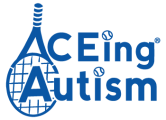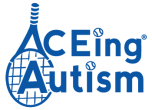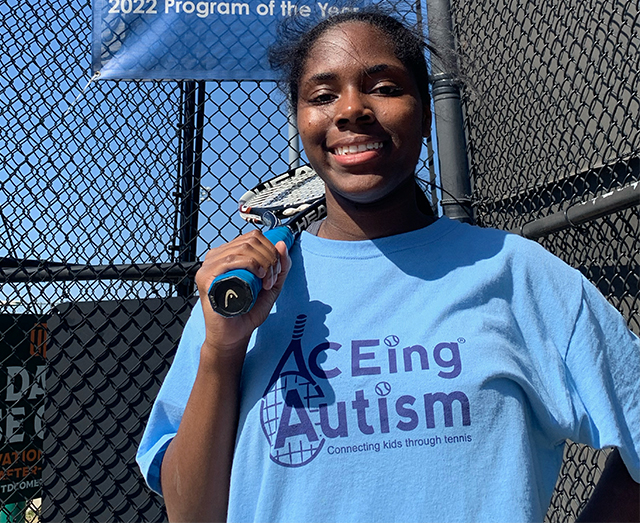Meet Aniah O’Neal, a 15-year-old athlete from our Dallas program who has worked her way into the match play group!
“She was asked during one of her life skills sessions one of her accomplishments, and she said that one she was really proud of is that she moved up a level in tennis,” her mother Karrie O’Neal said proudly.
Aniah was diagnosed at six years old, but her Mom, Dad, and family have never let autism be a limitation. “Autism is not what we use as a limitation, it is what we use to see what she can do and how she can do it differently,” she explained. Her parents’ goals for her is to take the approach of, “how can we make this work? How can we do things differently so it works?”
For that reason, and because she believes in learning through doing, they started doing things like gymnastics and dance. “She liked the program, she had mini competitions, and participated with a team. We’ve always encouraged Aniah that if she wants to try something, she can try. If it’s something she really likes, she’ll continue,” she laughed. This is why when she found ACEing Autism by doing research, she thought it would be a good idea. “She had started watching tennis and looked like she was interested in it, so I looked it up. Karrie’s goals for Aniah at ACEing Autism are focus and staying engaged as those are areas of challenges for her daughter. “She’s always had pretty good hand-eye coordination but her focus might take her away from that. If she is not interested, after five or 10 minutes, it’s ‘mommy, can we go?’ But ACEing Autism has kept her engaged.”
In addition to finding a sport she enjoys doing, Aniah found some friends when she first started. “Once we got here and saw friends from other activities (theater for kids with special needs), she was excited to see them,” her mom recalled.
Karrie has also enjoyed seeing her daughter realize that tennis helps her with fitness and being healthy. “She realizes that she has to do some exercises. It’s also been amazing to see her confidence and self esteem grow, as this is something else that she can do. We can use it as a way to show her that ‘if you have success here, then you can have success somewhere else.’”
As we talk about success and what it looks like, the discussion comes back to how proud Aniah felt when she was moved up to the match play group. “After the second year, she came to me and said ‘mommy, I think I’m ready to move up to match play,’ so we talked with coach Adrienne and she asked a few coaches to observe her. Following their guidance and Aniah’s hard work, she agreed,” Karrie recalled beaming.
“Now, we need to focus on learning how to move, putting the ball in the box, and learning how scoring works. She realizes that it’s more of a challenge but she is not discouraged.”
Even though Aniah is still pretty quiet, she is working on it and she’ll say hello at the gate. “It’s still an area of growth,” Karrie, who now works with adults twice a week, said with a chuckle in her voice.
As our conversation came to an end, Karrie wanted to repeat this message she feels has benefitted her family and her daughter as they navigate autism. “Autism is not the totality of who she is or what she can do!!”





